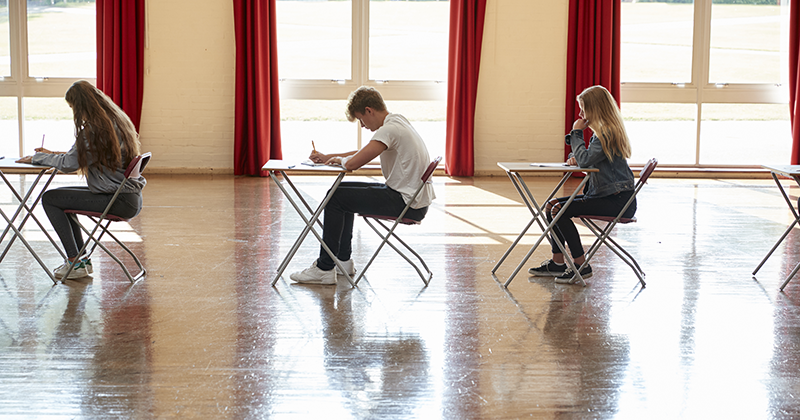Schools should use mentoring and sports to support vulnerable pupils, survey pupils on where and when violence takes place and “cautiously” consider interventions that aren’t backed by “robust evidence” and avoid harmful practices.
The Youth Endowment Fund – a charity similar to the Education Endowment Foundation set up to test approaches to tackling youth violence – has published new guidance for schools.
A Teacher Tapp poll carried out for the charity in 2023 found 67 per cent of teachers reported that a child had physically assaulted another child in the last term. Forty-three per cent said a child had assaulted a teacher or other staff member.
Fifteen per cent of teachers reported that a child had brought in a weapon, while 12 per cent reported sexual assault against another child and 1 per cent against a staff member.
However, the report said schools are “still safe spaces”. Eighty-nine per cent of teachers agreed they felt safe in school, while only 5 per cent said they did not. A separate YEF survey of 7,500 teenagers found 85 per cent reported feeling safe.
The YEF’s new guidance “aims to reduce children’s vulnerability to violence by making effective support more accessible in schools”.
YEF executive director Jon Yates said: “By bringing these services and support into schools, where children spend much of their time, we can improve access for the most vulnerable and help all children live a life free from violence.”
1. Keep children in education
The YEF said schools should use “evidence-backed strategies to improve attendance and behaviour” in order to ensure children are “actively engaged in their education while benefiting from the protective environment schools provide”.
Such interventions include meeting parents and carers of children to “establish the reasons for low attendance and discuss support and strategies for solving this”. Schools could also offer “reduced-price meals, such as breakfast clubs”.
Schools should also implement “whole-school and targeted support to reduce the need for exclusion” and provide “appropriate support for temporarily suspended and permanently excluded children”.
2. Provide children with ‘trusted adults’
The report said when children are vulnerable and need support, having a “positive adult role model whom they can turn to for help and guidance can make a big difference”.
It suggested schools facilitate these “meaningful connections” by providing one-to-one mentoring by trained adults to support vulnerable children.
Schools could also engage vulnerable children in sports “with coaches who can support them”.
Both of these approaches have been “shown to reduce violence, improve behaviour and develop social skills”.
3. Develop children’s social and emotional skills
Schools should develop children’s social and emotional skills with a “universal curriculum, targeted support and whole-school strategies”.
They should provide violence-reduction sessions to secondary-age children, implement an anti-bullying strategy and support access to therapy “for children who require additional support”.
The YEF said its research showed that lessons and therapies “aimed at helping children regulate their emotions, control impulses and empathise with others can reduce crime by up to 30%”.
Lessons focused explicitly on dating and relationship violence “are also effective, reducing violence by 17 per cent”.
4. Target efforts at the places violence occurs
Research “indicates that violence happens more often in certain places and at certain times”, the report warned.
Schools should therefore survey pupils to “identify when and where they feel less safe and provide targeted, evidence-based activities in response”.
The charity also recommended schools meet with local partners such as the police, youth justice services and local authorities to “share relevant information and coordinate safeguarding efforts”.
5. ‘Cautiously’ consider unproven strategies
The report said schools with limited resources should “prioritise approaches and interventions which are supported by evidence to work”.
The Teacher Tapp poll found three in 10 teachers reported their school was using knife crime education assemblies or lessons.
But “unfortunately, there is no robust evidence regarding the impact of these programmes”.
“Given the lack of research, education leaders could instead spend their limited resources on strategies with a stronger evidence base, such as providing trusted adults and developing children’s social and emotional skills.”
6. ‘Little’ known about trauma-informed training
The charity also said that “trauma-informed principles”, which acknowledge the impact of past trauma on pupils’ behaviour, could lead to “targeted support that some children may need”.
Thirty per cent of primary and 38 per cent of secondary teachers told the Teacher Tapp survey their school delivered trauma-informed practice training for teachers.
But “unfortunately, we know very little about how to effectively train teachers to recognise trauma and amend their practice in response to it”.
The YEF is “currently funding research that aims to better understand the impact of trauma-informed practice training”.
“While we await further evidence, leaders should carefully consider whether trauma-informed practice training is a priority in your setting.”
7. Avoid ‘harmful’ approaches
Leaders should also be “aware of approaches that can have a harmful impact”.
Prison awareness programmes “are a prime example of these”. The YEF said its research had found such programmes “do not seem to have a desirable impact on children’s involvement in crime and violence”.
“In fact, research suggests they could increase the likelihood that children become involved in crime.”
The poll found 1 per cent of teachers reported their school ran visits to prisons, while 5 per cent said their school hosted assemblies from former prisoners.











